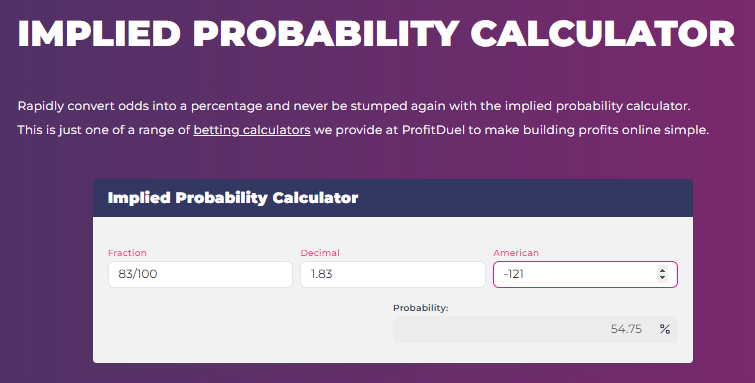CALCULATORS
POISSON DISTRIBUTION CALCULATOR
Calculate the profitability of your prop bet and gain an edge over the sportsbook with our free Poisson Calculator.
This is just one of a range of betting calculators we provide at ProfitDuel to help you level-up your betting profits.
FREE GUIDE
USE PROBABILITY TO MAKE MONEY (+ MORE SMART STRATEGIES)
Join the top 3% of bettors by uncovering these 6 game-changing strategies.

Open fast find
Close fast find
START YOUR PROFITDUEL TRIAL
Start your ProfitDuel trial today and we'll walk you through locking in $100 profit with your first offer.
1. What is a Poisson Distribution Calculator?
A Poisson distribution calculator is a tool that calculates the probability of an event happening a specific number of times based on an average rate. It’s commonly used in sports betting to calculate probabilities of propositional, or “prop”, bets.
- Requires just two inputs: expected average and proposition.
- Instantly outputs exact and cumulative probabilities.
- Helps identify mispriced sportsbook odds.
- Can be used across sports like football, basketball, and soccer.
- Eliminates manual math, speeding up smarter betting decisions.
Also known as Poisson calculator or Poisson probability calculator.
"A prop bet, short for proposition bet, is a wager in sports betting not tied to the final score or outcome of a game."
For example, a bettor may want to know the probability of a soccer team having three shots on target in their next game. To help with this, the Poisson calculator would use two inputs, ‘expected average’ and 'proposition', to tell them the probability of that occurring.
If the probability calculated by the calculator is higher than the sportsbook's implied probability for that bet, this could indicate the bettor has an edge over the sportsbook.
We'll explain exactly how this works in the next section.
2. How Do I Use a Poisson Calculator? Worked Example
Here we'll show the six steps to using a Poisson calculator to calculate event probability, including a worked example.
1) Choose Bet Selection
Pick a selection from a sportsbook that you believe could be 'Poisson' (you think the sportsbook odds given may be undervalued). In our example, we're using the number of 3-point shot attempts by the Chicago Bulls in their next basketball game.
We know from research that on average, the number of 3-pointers the Bulls attempt in a game is 15.2. We can also see our sportsbook has offered moneyline odds of -115 for the Bulls to have at most 15.5 3-pointer attempts (meaning 0-15 attempts).
2) Input Expected Average
The expected average is the number of events we expect to occur. For our example, we'd input 15.2. In different examples, this could be the number of goals we expect a soccer team to score or touchdowns in a football game.
3) Input Proposition
This is the number of events specified by the sportsbook in the bet. In our case, we'd input 15.5.
4) View the Results
The calculator will automatically calculate the probability of the Bulls attempting at most 15.5 3-pointers. It will also show a full distribution of probabilities for your selection.
Using our example, we would see:
- More than 15.5 3-point attempts = 45.24%
- Less than 15.5 3-point attempts = 54.76%
5) Compare Odds
Now we've got the true probability percentage of our selection (54.76%) it's time to convert that to odds to see whether we have an edge over the sportsbook.
Using an implied probability calculator, we type in our 54.76% percentage and it shows us the American odds equivalent is -121.05.

When we compare this to the sportsbook's odds for this selection of -115, we can now see that the sportsbook has undervalued its odds.
This means that, statistically speaking, we have an edge over the sportsbook. In this case we would have a 2.4% edge.
6) Place the bet
You've now identified you have an edge over the sportsbook, and statistically speaking, are likely to have a profitable bet. If you're happy with the selection, all that's left to do is log into your sportsbook and place your bet.
Remember: Having an edge over the sportsbook does not guarantee a profit. It simply states in statistical terms, you are likely to receive a profit with this selection.
Poisson Calculator Input Guide
| Poisson Input | What to Enter | Quick Tip for Bettors |
|---|---|---|
| Expected Average | Historical mean for the event (λ) | Use team or player season stats from a trusted source |
| Proposition (k) | Sportsbook line you’re testing | Match the line shown in your sportsbook exactly |
| Exact Probability | Calculator output for exactly k events | Ideal for predicting specific stat lines |
| Cumulative Probability | Probability of ≤ or ≥ k events | Great for “over/under” or “at most” prop bets |
| Edge (%) | Difference between Poisson % and book % | Positive edge = +EV bet |
📈
What The Data Says
"A recent academic study found Poisson-based models correctly predicted match outcomes about 60% of the time in Estonia's top league, outperforming a flat-bed approach and validating its value in real-world betting scenarios."
- Estonian Sports Research Institute
3. Do I Need to Know the Poisson Formula to Use the Calculator?
Simply put, no. Our Poisson calculator does all of the hard work for you.
This saves you the time, effort and potential confusion of worrying about complex math like standard deviation, lambda, variance, random variables, rate of success and more. 19th-century French mathematician, Siméon Denis Poisson, did that for us!

Instead, just follow the six steps above and you can use the Poisson distribution calculator easily and effectively when sports betting.
4. What are the Benefits of Using a Poisson Calculator in Sports Betting?
A Poisson calculator can have a wide range of benefits in the world of sports betting. Here are five of the most powerful:
- Long-Term Profits: Identifies potential edge over a sportsbook, increasing the likelihood of profitable betting decisions in the long term.
- Time-Saving: Rapidly determines the likelihood of a range of betting outcomes, hugely reducing the time it would take to follow the formula and find calculations manually.
- Broad Application to Sports: Relies on a model that can be used in most sports to find event probability, from soccer goals to football touchdowns and basketball 3-pointers.
- Stat-Backed: Uses a mathematical formula to produce a statistically backed answer, unlike less data-driven calculators like a parlay calculator and round robin calculator. This can reduce the unreliability of opinion or emotional betting.
- Opportunity Identification: Our calculator doesn't just show a probability for one outcome, but shows a distribution of up to five probability percentages. This can help identify other potentially profitable bets you hadn't considered.
Top Prop Markets Where Poisson Models Shine
| Sport | Prop Bet Type | Why Poisson Works Well |
|---|---|---|
| Soccer | Team goals, shots on target | Events are discrete, low-frequency, and average rates are well-documented |
| Basketball | 3-point attempts, blocks, turnovers | High sample sizes stabilize averages, making the model more predictive |
| American Football | QB sacks, rushing attempts, red zone plays | Individual event tracking aligns with prop lines for players and teams |
| Baseball | Strikeouts, walks, home runs | Batter/pitcher matchups are ideal for isolating expected event rates |
| Hockey | Shots on goal, penalties, saves | Frequent low-impact events suit Poisson’s independence assumptions |
💬
What Our Experts Say
"Over hundreds of prop markets I’ve tracked, pairing historical averages with a Poisson calculator routinely flags lines mispriced by 2–4 %. Acting only when that edge appears has been the single biggest driver of long-term profit preservation in my bankroll."
- Chris Allen, Sports & Matched Betting Expert at ProfitDuel

5. Are There any Limitations to Using a Poisson Calculator in Sports Betting?
Though the Poisson calculator, grounded in probability theory, can have a range of benefits and successes to sports bettors, it's equally important to note the tools limitations. Five of the most significant are:
- Inability to Factor in Context: Fails to incorporate contextual factors such as weather conditions, player injuries, or team morale.
- Overlooking Tactical Changes: Does not account for tactical adjustments made during matches, impacting prediction accuracy.
- Vulnerability to Outliers: Susceptible to outliers in data, which can skew predictions and compromise reliability.
- Influenced by Personal Input: Exact averages for bet selections to input to the ‘expected average’ cell won't always be available to find. This can lead to assumed averages being used which can reduce accuracy.
- Profits Aren't Guaranteed: Though it can be a valuable tool to increase long-term betting profitability, the Poisson probability distribution is not a fool-proof model and cannot guarantee returns.
💬
What Our Experts Say
"When bettors feed shaky averages into Poisson models, probability swings by double digits and the false edge evaporates. I always sanity-check sample size and context (injuries, pace, weather) before trusting the output, or I risk turning math confidence into expensive noise."
- Casey Halpern, Sports Betting Expert at ProfitDuel

6. 4 Strategies to Use Alongside/Instead of Poisson Betting
Though Poisson betting can be a helpful tool in a sports bettor's lineup, it's be no means the most popular (or effective) betting strategy.
Here are four alternatives to Poisson betting for maximizing returns and minimizing risk:
1) Matched Betting
Perhaps the most effective smart betting method for earning serious monthly profits, matched betting involves betting on every outcome of a sporting event to unlock a sportsbook promotion risk-free, before converting that into withdrawable profits.
This process can be made simple with the help of tools like a Dutch Matcher, Dutch Calculator and free bet conversion calculator.
2) Arbitrage Betting
Similarly, arbitrage betting involves betting on all outcomes of an event to remove risk, supported by thorough odds analysis. However, unlike matched betting, with arbing you don't unlock a free bet and instead aim to profit from inconsistencies in odds across different sportsbooks, with the help of an arbitrage calculator.
This can be an effective risk-mitigating betting strategy, but does not offer the same opportunity to maximize profits over a short that matched betting does.
3) Kelly Criterion Betting
Kelly Criterion betting is closer to Poisson betting in that it is more of a statistical model-based betting strategy that can support betting, giving it more of a risk profile than processes like matched betting and arbing.
It involves using a Kelly Criterion calculator to calculate the mathematically ideal stake to place on a bet in relation to its odds and your available bankroll.
4) Expected Value Betting
Expected value betting (or EV betting), like the above strategy, is also not a risk-free betting strategy, but more of a long-term model for increasing betting profits.
Similarly to Poisson, it involves identifying an edge over the sportsbook. However, it's more straightforward in that the expected value calculator uses odds, win probability and wager amount to calculate whether the selection is statistically profitable.
7. Get Started Smart Betting
If you want to burn valuable time doing painstaking calculations just to gradually grow your sports betting profits (or worse yet, run the risk of losing money), you can carry on sports betting as usual. But if you're ready for a change, it might be time to consider matched betting.
Matched betting is a rapidly growing betting strategy in the US, with more than 500,000 users in the states and Europe using the process to earn serious monthly profits with very little work. At ProfitDuel, we're the experts in it, with over a decade of experience in the industry and 400,000+ members across the US and our European arm OddsMonkey.

Simply put, matched betting involves strategically betting on every outcome of a sporting event in order to unlock a sportsbook promotion (such as a free bet), before repeating the process using your promotion to lock in winnings.

At ProfitDuel, we make this full process seamless and simple. Providing you with all of the software, strategies and one-to-one support to lock in profits right from your first day. Just ask our customers - their results speak for themselves.
And the best part? We're offering a ProfitDuel trial, including all the software, strategies and support you need to lock in profits from sportsbook promos from the get-go.
FAQs on the Poisson Calculator
What does a Poisson distribution calculator do in sports betting?
A Poisson distribution calculator estimates the probability of a certain number of sports events (like goals or shots) happening, based on an average rate.
Can I use a Poisson calculator for live sports betting?
Poisson calculators are best suited to pre-match bets using known stats. Live betting involves dynamic conditions the model doesn’t account for.
What inputs do I need for a Poisson calculator?
You need two values: the expected average number of occurrences and the specific event count (proposition / prop) you want the probability for.
How accurate is the Poisson distribution for sports outcomes?
It's mathematically sound but unfortunately, not perfect. For example, it doesn’t account for player injuries, weather, or tactics that affect real-world outcomes.
Does the Poisson calculator work for all sports?
It works for most sports with countable events, such as goals, touchdowns, or 3-point attempts, as long as the event frequency is independent.
Can a Poisson calculator help me beat the sportsbook?
It can help identify edges where your calculated probabilities are better than implied sportsbook odds, but outcomes are never guaranteed.
Is Poisson betting legal in the US?
The poisson distribution calculator is a math tool designed to support your decision-making; it's not a form of gambling in itself. And as such, using a Poisson calculator is completely legal.
What’s the difference between Poisson and expected value betting?
Poisson betting uses a statistical model to calculate event likelihood, while expected value betting weighs probability against the odds to assess profitability.
Can I use this calculator on mobile or only desktop?
Most Poisson calculators, including ours, are fully mobile-compatible for quick prop bet calculations on the go.
Do I need to understand the Poisson formula to use this tool?
No. The calculator does all the math for you! Just input your average and proposition to get results instantly.
RECOMMENDED CALCULATORS
WOULD YOU LIKE TO KNOW MORE OR DO YOU HAVE ANY QUESTIONS?
Our dedicated support staff are on hand to help you out and keep the profits flowing. Mistakes in the process can happen too and sometimes you might need a bit of advice on what to do.
Our working hours are 8am to 8pm EST, Monday to Sunday.

.png?width=50&height=50&name=download%20(1).png)

